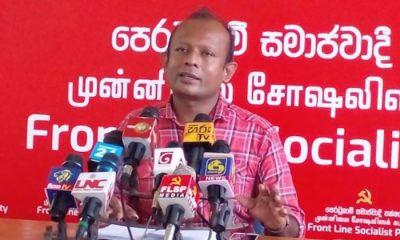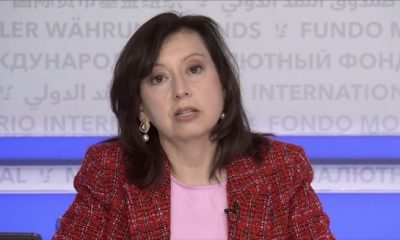Features
IMF-led privatisation, land and resource grab in Sri Lanka
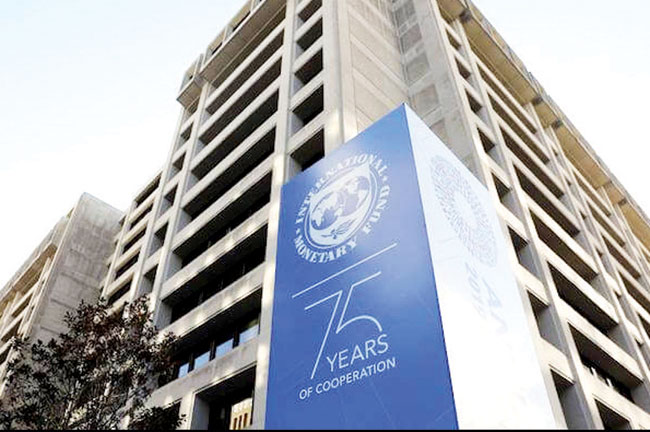
BY DR. Asoka Bandarage
On September 1, 2022, debt-trapped Sri Lanka reached a preliminary agreement with the International Monetary Fund (IMF) for a 48-month Extended Fund Facility of $2.9 billion, which hardly covers the country’s outstanding debt, nor its immediate survival needs. Nevertheless, IMF structural adjustment requires the country to meet its familiar debt restructuring conditions: privatisation of state-owned enterprises, cutbacks of social safety nets and alignment of local economic policy with US and other Western interests. There are already signs that these policies would be detrimental to the well-being of ordinary Sri Lankans and the sovereignty of the country and will inevitably lead to more wealth disparity and repeat debt crises.
The most important source of generating state revenue identified in the 2023 Sri Lanka budget is the privatisation of SOEs (State Owned Enterprises), a primary strategy of IMF structural adjustment and neoliberal economics. The 2023 Sri Lankan budget states:
“The government is currently maintaining 420 State-owned enterprises. 52 of these generate over Rs. 86 Billion in losses… A Unit has now been established at the Ministry of Finance with the specific task of restructuring SOEs. Initially, measures will be taken to restructure Sri Lankan Airlines, Sri Lanka Telecom, Colombo Hilton, Waters Edge, and Sri Lanka Insurance Corporation (SLIC) along with its subsidiaries, the proceeds of which will be used to strengthen foreign exchange reserves of the country, and strengthening the Rupee.”
The left-wing and nationalist Bandaranaike governments established many SOEs between the mid-1950s and the mid-1970s, many of them import substitution industries to replace foreign imports with domestic production. Many SOEs were privatised after the introduction of the Open Economy in 1977, and privatisation (or commercialisation) has continued steadily since then, with successive governments selling SOEs outright or turning them into Public Private Partnerships (PPP).
There are 55 strategic SOEs, 287 SOEs with commercial interests and 185 SOEs with non-commercial interests in Sri Lanka. The 55 strategically important SOEs are estimated to employ around 1.9 percent of the country’s labor force. The total state sector workforce is estimated to be about 1.4 million people, which accounts for over one in six of the country’s total workforce. Many Sri Lankans prefer to work for the government sector given job security, retirement and other benefits. There are concerns that “…privatisation can result in lower salaries and benefits as well as retrenchment and high employee turnover,” and that privatising SOEs that enjoy monopolies can result in “corporations making decisions based on profits rather than on public benefit.”
Unlike the private sector, many of the SOEs in Sri Lanka have powerful trade unions, with workers of different skills and professional levels, which have fought for workers’ rights and the country’s sovereignty for decades. Privatisation is likely to lead to the elimination of many trade unions, strikes and other forms of labor resistance. In October 2022, Ceylon Petroleum Corporation (CPC) workers held a protest strike against the proposed privatisation of the CPC. Similarly, 1200 union workers of the Government Press plant – also targeted for privatisation and cutbacks in wages, work conditions and jobs – went on strike in November 2022.
The CPC, a vital enterprise in the island’s oil supply and energy security, has been targeted for privatization under the IMF restructuring programme. Lanka India Oil Company (LIOC), China’s Sinopec, Petroleum Development Oman and Shell have expressed interest in this deal. It is important to note that, in the name of privatisation, the CPC is being handed over to state owned enterprises of powerful foreign countries. The parent company of LIOC is the Indian Oil Corporation Limited (IOC) which is owned by the Ministry of Petroleum and Natural Gas of India. Similarly, Sinopec Group is the world’s largest oil refining, gas and petrochemical conglomerate and is wholly owned by the Chinese state; and Petroleum Development Oman is owned by the Government of Oman, Royal Dutch Shell, Total Energies and Partex.
Parasites and Vultures of Privatization
Sri Lanka must take lessons from privatisation episodes in other parts of the world. According to a 2016 study, ‘The Privatising Industry in Europe’ by the Transnational Institute in Amsterdam, privatisation in Europe has failed to produce the expected revenue as only “profitable firms are being sold and consistently at undervalued prices.” The study notes that privatised firms are no more efficient than state-owned firms and that, under the rubric of privatisation, many European energy companies in Portugal, Greece and Italy, have been sold off to state-owned corporations from China. The Study also states that privatisation in Europe has “encouraged a growth in corruption, with frequent cases of nepotism and conflicts of interest” in Greece, Italy, Spain, Portugal and the UK.
We must also be vigilant for conflicts of interest in such large deals involving public money and wellbeing. For example, the financial and legal advisory firms Clifford Chance and Lazard have been hired by the Sri Lankan government to assist with IMF debt restructuring. The Transnational Institute Study lists Clifford Chance as part of a small group of privatisation advisory law firms, with annual revenues of more than a billion Euros, “reaping huge profits from the new wave of crisis-prompted privatisations.”
Lazard is reputed to be both “the number one sovereign advisory firm” and “the world’s largest privatisation advisory player.” Lazard’s operational global headquarters are in New York City, but the company is officially incorporated in Bermuda – always a warning sign when it comes to (lack of) financial ethics. In previous government advisory contracts, Lazard has taken advantage of its prominent position by involving itself not only its advisory services branch, but also its asset management branch. According to the Study, “Upon the Initial Public Offering (IPO) of important state companies, Lazard has on a number of occasions undervalued the price of a company, which has allowed its asset management branch to buy up the stock at low prices which have then been sold for considerable profit when stock prices soared.”
The practice of both advising on processes of privatisation and then profiting from that advice, raises ethical questions about Lazard. Questions are also raised about the entire global financial industry responsible for creating debt crises in the first place, and then finding devious ways to benefit from them, at the expense of debt-trapped countries.
Despite such serious concerns over privatisation, there is now an enormous push by local and international actors that the solution to Sri Lanka’s debt and economic crises is to privatise the remaining SOEs, and no doubt a select few profit greatly in the process.
A key local player in this is the Sri Lankan NGO, the Advocata Institute in Colombo, which is associated with the Mont Pelerin Society and the Atlas Network and their neoliberal agenda. Advocata is spearheading a major campaign to convince the public that privatisation of SOEs is the path to ‘reset Sri Lanka’ for solvency and prosperity. The ‘Great Sri Lanka Fire Sale’ of state owned enterprises and strategic assets is now on, with huge returns expected for colluding local and global financial and corporate elites and pauperisation for ordinary people.
Land Privatization
One key state-owned resource at risk is land, such that commoditising state-owned land is a major aspect of privatisation in Sri Lanka. Not only the land, but water – indispensable for survival of life on Earth – is threatened by privatisation and commoditisation in Sri Lanka and around the world.
This is not new; privatising and commoditising state land for export production has been going on in Sri Lanka since the British colonial era. Although the more recent neoimperial US Millennium Corporation Compact agenda, initiated under George W. Bush in 2002, has not been officially signed by Sri Lanka, contemporary Sri Lankan governments have been advancing its agenda of privatising state land to prioritise export production over local food production, despite rising prices of imported food and the food crisis facing the country.
Two very important proposals in this regard have been slipped into the 2023 budget proposals without public discussion. Firstly, Clause 12.1 on ‘Lands for Agricultural Exports’ states:
“A vast amount of land belonging to Janatha Estate Development Board [EDB), Sri Lanka State Plantation Corporation (SPC), and Land Reform Commission (LRC) remains without being cultivated or productively utilized for a long time, ….. Accordingly, a programme will be devised to allow investors to productively utilise them in a manner to increase both the production and exports. Hence, it is expected that large parcels of unutilised/unproductively used lands will be leased out on long-term basis to grow exportable crops…”
Secondly, Clause 13.1 of the 2023 Budget on ‘Disposal of Government Lands’ states:
“…activities related to the disposal of government lands are carried out by District Secretaries/Government Agents through Divisional Secretaries/ Additional Government Agents…, , such duties were also allocated to Sri Lanka Mahaweli Authority and Land Reform Commission which were established for special requirements at a later stage…there are occurrences of discrimination and malpractice as …activities related to disposal of lands … Therefore…, a programme will be prepared during the next year to enable preliminary activities in relation to disposal of all government lands including the disposal of lands under the above two institutes only by the Divisional Secretaries.”
Nationalist members of Parliament and the Federation of National Organizations have criticised the move to place state land under Divisional Secretaries as a ploy for land grabbing, and that the move to deliberately privatise state land may have ‘irrevocable consequences.’ While recognising the need to reform the existing Land Reform Commission, they point out that solely empowering Divisional Secretaries would encourage partisan land distribution. The 2023 Budget seems to put the MCC Compact into effect although activists challenging the Compact have warned of a neocolonial agenda for a massive modern-day land grab, displacement and peasant pauperization.
There is great concern over the legitimacy of crucial land and other privatisation decisions taken by President Wickremesinghe as neither he nor his United National (UNP) Party have a mandate to do so from the people. The land, the ports and the state enterprises do not belong to politicians but to the people and to future generations of Sri Lankans. Clearly, there needs to be careful deliberation of alternatives before the IMF dictated ‘Great Sri Lanka Fire Sale’ is allowed to proceed.
(COURTESY ASIA TIMES)
Features
Pluralism and democracy increasingly targeted in US

 If anti-Semitism is indeed on the rise in the US’ seats of higher learning and elsewhere in the country, the federal and state governments of the US are obliged to stamp out by non-coercive means such divisive tendencies without delay. This is in view of the US’ status as a foremost democracy of the world.
If anti-Semitism is indeed on the rise in the US’ seats of higher learning and elsewhere in the country, the federal and state governments of the US are obliged to stamp out by non-coercive means such divisive tendencies without delay. This is in view of the US’ status as a foremost democracy of the world.
Anti-Semitism and other forms of racism run antithetical to the principles of democracy and governments claiming to be democratic have no choice but to ensure that such blights do not take root in their countries. Accordingly, anti-Semitism and antipathy towards Palestinians and the Islamic faith, for instance, are in the same league of heinous offences that demand instant eradication by governments that are pledged to upholding democracy and its core principles and values.
However, the above responsibility does not devolve only on governments. The obligation is cast on all sections of society that cherish democracy to denounce racism in all its forms and to help in its eradication.
For example, if the Israeli state comes to be perceived as racist, the same applies to those sections in the Islamic and Arab world and outside who voice their support and by their selective silence promote those states and groups in the Middle East that are supportive of anti-Israeli militant violence that is pledged to destroying by whatever means the Jewish state. A solution to the Middle East conundrum needs to be entirely democratic in nature and should be sensitive to the prime needs of the principal parties to the conflict.
These home truths, as it were, need to be borne in mind at the present juncture when some of the US’ most prestigious universities, such as Harvard and Columbia, are coming to be seen by the Trump administration as fostering anti-Semitism. Among other things, these universities are being pressured by the administration to not only end ‘anti-Semitism’ but to also see an end to diversity, equity and inclusive policies and programs that have been initiated by them. If the universities fail to act in this direction they would be at risk of losing state financial assistance that have been hitherto extended to them, reports indicated.
As has been noticeable over the past few months, anti-democratic tendencies are steadily on the rise in the US and directives to the country’s universities to see an end to diversity and equity programs, for example, could only help in deepening these anti-democratic proclivities. Indeed, not only is white supremacy being enthroned in the US but ethnic equity and pluralism are being seen as dispensable values. That is, democracy is being dealt a fatal blow.
In the medium and long terms in particular, a state-backed white supremacist ideology would only increasingly contribute towards societal discord in the US. This is because a policy of non-inclusivity would result in the country’s ethnic, religious and cultural minorities turning hostile towards the state and those sections supportive of it.
Thus, the Trump administration could be seen as eroding the democratic credentials of the US and paving the way for an eventual onset of disintegrative tendencies that could make internal governance challenging.
A reliance by the central administration on purely coercive means to blunt such deleterious trends would only end up promoting the same divisive tendencies because a heavy reliance on law and order measures by a state in these circumstances usually brings about the very situation that is being sought to be avoided. That is, increasing anti-state violence and internal disintegration.
In view of the foregoing it is with skeptical doubt that the commentator needs to react to the Trump administration’s claims that a Middle East settlement is on its priority list. Considering that a political solution is not possible in the region in view of the administration’s downplaying of inclusivity and equity; rather than furthering the cause of peace, the commentator is left to conclude, that Washington is currently singularly focused on only serving the interests of Israel. Needless to say, this is not the way to go if a fair solution is to be aimed at. For, the ‘Two State solution’, which accords with democratic pluralism, remains the only viable path to a settlement.
However, it cannot be emphasized enough that the legitimate interests of all major parties to the conflict must be served if a political solution that is sparing of bloodshed and war is to be worked out swiftly. While an equitable solution must thus be strived for, it is crucial that Israel’s security is guaranteed by its adversaries in the Middle East and outside in iron-clad fashion. Until this condition is met it would be futile to speak of a viable solution.
As matters stand, the US is not qualified to take on the role of a Middle East peace broker. As long as it is seen as not treating all the major parties to the conflict equably, the US would be viewed with suspicion by the Palestinian side and its strong backers. However, countries such as Egypt and Qatar are, for instance, more qualified for the job.
The main task for the latter would be to persist in promoting a political solution. They are faced with the grueling challenge of convincing Israel, Hamas and the latter’s main backers of perceiving the futility of continuing with the bloodletting. In the short term, though, another Middle East ceasefire needs to be shored-up.
Unfortunately, the Trump administration is going largely unchallenged locally and internationally. The prime universities that are being directed to end their inclusivity programs and other ventures that are aimed at enhancing the US’ democratic credentials are fighting back but it is a wider, vibrant movement aimed at giving back to the US its democratic identity that could prove doubly effective. A getting back to the streets with increasing strength of those sections of the public that are staunchly opposed to Trump policies could yield some dividends currently.
The latter opposition sections need to be strongly backed by the Democratic Party which is yet to prove that it is living up to its role as the ‘government in waiting’. Hopefully, the latter would rise to the challenge sooner rather than later.
Features
Future economic growth requires political reforms today

The NPP government is under criticism for being slow to move forward with its election promises. The Opposition political parties have criticised it for not delivering on its promises with regard to renegotiating the IMF agreement to be more people-friendly. The government seems to have accepted the IMF targets for revenue collection and restricting government spending to the letter. Civil society groups are critical of the government for not repealing the Prevention of Terrorism Act (PTA) and Online Safety Act (OSA) which bolster the repressive potential of the government, and which the NPP had promised to repeal. The problem with the delay in implementing promised political reforms is that it not only undermines the government’s credibility but also has the potential to undermine Sri Lanka’s economic recovery.
Sri Lanka has received a breathing space of three months to negotiate with the US government regarding tariffs to be imposed on Sri Lankan exports to Sri Lanka’s largest export market. The country faces a similar challenge to protect its export markets with regard to the EU, its second largest trading partner and potentially its largest, which is currently favouring Sri Lanka with its GSP Plus tariff concession. This trade concession (or incentive) provides Sri Lanka with duty-free access to the EU market for over 6,000 product lines, including textiles, garments, and seafood. The continuation of GSP+ benefits is contingent upon Sri Lanka’s adherence to 27 international conventions related to human rights, labour rights, environmental protection, and good governance. It needs to be borne in mind that the GSP Plus facility was withdrawn in 2010 due to the government’s failure to meet human rights standards.
While Sri Lanka regained the GSP Plus in 2017, doubt was placed on its continuation when, in 2021, the EU Parliament called for a reassessment of the tariff concession on human rights grounds and called for the PTA to be repealed, citing its provisions for arbitrary detention and its misuse—especially against minorities in the North and East. The NPP’s own election manifesto pledged its repeal. But not only is the PTA still on the books, but it is being used to this day. In response to a query whether the EU is ready for any leniency in its approach this time because Sri Lanka is in an economic crisis, the EU Ambassador Carmen Moreno is reported to have said, “We are all going through a difficult time. Again, are you telling the IMF to lower the bar? And to give you a free pass? We are giving you duty-free access. You just have to comply.” Sri Lanka risks exclusion from the scheme in 2026 if it does not demonstrate tangible progress in fulfilling its obligations.
MAIN PRIORITIES
It would appear that the government’s main emphasis at the present time has been to keep the economy functioning smoothly without mishap which explains its adherence to the IMF agreement. The government feels that the growth of the economy and the elimination of corruption and waste are the two main factors that propelled it to power at the last presidential and general elections. It needs to add the EU commitments to human rights to this list as they have a bearing upon economic growth. The EU’s Ambassador has made the point that the GSP+ mechanism is not a “stick” but an “opportunity,” and the EU seeks genuine engagement, transparency, and a credible roadmap for reform. The government needs to show the same degree of commitment to implementing GSP Plus conditions as it has to the IMF agreement and in putting an end to corruption and waste. The rejuvenation of the Bribery and Corruption Commission (CIABOC) is a reaffirmation of this commitment.
However, the government appears to be reluctant to get into other areas of governance at this time, preferring to limit its focus to the areas listed above. This may account for the reluctance to deal with other priority areas, such as the Prevention of Terrorism Act and national reconciliation, even though they are of importance to ethnic minorities and to sections of the international community. This can be seen especially in the government’s failure to repeal the PTA, despite election time pledges to do so. The irony is that the government has started to use the PTA to arrest suspects accused of crimes from the distant past and incarcerate them without recourse to judicial procedures, which can be for an extended period of time.
The NPP government seems to have given priority at this time to consolidate their hold over power. There are indications of resistance at the higher levels of the current administrative structures to the government’s efforts to reform the prevailing ways of doing things. There is a tussle between those who have been newly appointed by the NPP government, who themselves are often from the NPP, to decision making roles and those who have to follow their directions. This may account for President Anura Kumara Dissanayake’s assertion at the launch of the CIABOC’s new programme that the government has given six months to government officials to change themselves to fit in with the new ethos, and if they do not, they will be changed by the government.
FUTURE ASSURED
Engaging in a more inclusive governance process that includes the Opposition and, especially, the ethnic minority parties, will be important to both the government and country’s longer term stability. It will give scope for new thinking and new opportunities to be sought by those with talent and experience from outside of the NPP even while the NPP remains the decision making body, as mandated overwhelmingly by the electorate. Obtaining the support of the ethnic minority parties, in particular, is going to be important to the viability of the government in the longer term. The international community is susceptible to lobbying by the Tamil Diaspora and by international human rights organisations. Both of these groups have been very critical of the failure of successive governments to resolve the problems that can be traced to the ethnic conflict.
So far, the government has not been giving emphasis to the national reconciliation process which calls for both dealing with contentious issues of dealing with past war-time abuses of human rights and also the contentious issue of a political solution to the ethnic conflict. The government seems to have put these issues to be dealt with in a second phase of problem solving that could commence at a later point of time.
Until the visit of Prime Minister Modi and discussions with him, the government took the position that provincial council elections would be held only next year even though they have already been postponed for over six years. Such a position is unacceptable to the ethnic minority political parties who see in this an absence of commitment to the need for fairer interethnic power-sharing, in particular the Tamil political parties.
The government’s way of showing change on the ground has been to assert that all people will be treated equally without regard to their ethnicity or religion. But this may not be true in reality. There is a clear need for more speedy resolution of the problems of missing persons, return of military-occupied lands to their original owners, reducing the size of the military to be on par with other parts of the country, giving compensation to victims of human rights violations, and holding provincial council elections. Besides, high level appointments to government committees have been mainly from the majority community, and even administrative appointments at the higher levels in the east, which is majority Tamil-speaking, are the same. The NPP came to power promising systemic transformation. That promise must extend beyond anti-corruption and economic management to encompass democratic governance and national reconciliation.
by Jehan Perera
Features
Nipping the two leaves and the bud

” The locals were not interested in working in the plantations sector, so people were brought from India to work here.”
 As a 16-year-old sitting my GCE O/L examination, I never realised the gravity of these words. Presented to us as an afterthought when discussing the history of our country, I could not see how an entire community and their story of struggle were erased. Nor could I understand the importance of this brief statement against the backdrop of endless historical political reforms. Our texts drew attention to the needs of ‘locals’ and how labour could be easily acquired from elsewhere to suit the whims of our former British colonial masters, dead set on introducing coffee plantations. However, delving into the process of acquiring this labour, the conditions of existence leading to their taking up this arduous task, or this crude objectification of an individual, where they were “brought” to another country, without their consent, was missing in our grand narrative of Sri Lankan history and insignificant, as our sole purpose was passing our examination. Our conformity in unconsciously othering a group of people from the outset of their entry to this country as second-class citizens did not register in our 16-year-old heads.
As a 16-year-old sitting my GCE O/L examination, I never realised the gravity of these words. Presented to us as an afterthought when discussing the history of our country, I could not see how an entire community and their story of struggle were erased. Nor could I understand the importance of this brief statement against the backdrop of endless historical political reforms. Our texts drew attention to the needs of ‘locals’ and how labour could be easily acquired from elsewhere to suit the whims of our former British colonial masters, dead set on introducing coffee plantations. However, delving into the process of acquiring this labour, the conditions of existence leading to their taking up this arduous task, or this crude objectification of an individual, where they were “brought” to another country, without their consent, was missing in our grand narrative of Sri Lankan history and insignificant, as our sole purpose was passing our examination. Our conformity in unconsciously othering a group of people from the outset of their entry to this country as second-class citizens did not register in our 16-year-old heads.
Interestingly, however, while erasing the existence of those who labour on the plantations, with any reference to Sri Lanka globally, the camera naturally redirects itself towards the flourishing plantations. Greeted with the ever-smiling and welcoming faces of women carrying their straw baskets, plucking tea leaves with their nimble fingers, we stay true to our household name, confirming tea as an unerasable part of our identity as Sri Lankans. With proper branding and quality control at work, tea as a graded commodity has been exported throughout the years, establishing a secure global market and making a remarkable contribution to Sri Lanka’s revenue. Today, tourists can even afford the luxury of briefly testing their tea-plucking skills at plantations as part of their “Sri Lankan experience”. Sumathy Sivamohan, in her Kuppi Column “Two leaves and a bud: the history of Malaiyaham as pedagogy” (02.01.2024), traces the history of this tea plucker, their community, and their marginalisation since their arrival in Sri Lanka almost 200 years ago. Although allowed to feel as ‘rightfully’ part of the country with the Citizenship Act (2003), to this day, the Malaiyaga community, given their ties to a bygone Indian ancestry, are not afforded the amenities available to their peers. Gnannamuttu, in his book “Education and the Indian Plantation Worker in Sri Lanka”, quotes H. W. Cave on “a little too much education and unaccustomed luxury [unfitting] these children [of the plantation sector] for their calling…” Accordingly, private initiatives introduced night (line) schools and missionary education to this community to keep a check on their identity. However, these initiatives stood strong in their unwillingness to enter the expensive enterprise of ‘properly’ educating these outsiders at the cost of their produce, as a labourer’s primary ‘calling’ was tending to the plantations. Even with the government taking over these estate schools and Sri Lanka’s famed non-discriminatory free education policy being implemented, as stipulated in the Kannangara Bill (1945), this community was initially left stranded in the margins. According to Mr Rajendran, formerly President of the National College of Education-Batticaloa, our country was better equipped to train planters at managerial levels, as offered in some universities, indifferent to the concerns of the ever-smiling and ever-toiling tea plucker growing the tea straddling the margins of statelessness and citizenship to this day. Stark is this entanglement where there is a need to stunt this community’s growth through literacy and education while simultaneously ensuring they are only ‘fit’ to nip the two leaves and the bud. Thus, this community’s pick-up on the rat race towards development, literacy, and social mobility had been delayed by the state, and to date they are sprinting to keep up.
Upon attending an educational conference on Malaiyagam, in Hatto, earlier this year, I found the audience’s responses to the research conducted informative, especially on the quality of education afforded to this region. Concerns in student retention rates in the primary and secondary sections were brought up by teachers who made short work of shifting the blame towards the parents. It was also mentioned that students of this region have difficulties entering universities in the Maths and Science streams, and even those interested in pursuing the above or other technical subjects that would secure employment were often encouraged by their teachers to choose either Commerce or Arts, more commonly available to them for their GCE (A/L) examination. The teachers’ rationale for such encouragement is the high expenditure in acquiring this education, even after entering university. However, the unavailability of competent teachers and infrastructure facilities in the plantation sector to offer these STEM subjects undoubtedly bears some weight. Skipping our irreplaceable support system of tuition considered ‘compulsory’ for the GCE (A/L), here concerns were raised on the availability of basic Type 1AB schooling facilities afforded to this community. Students from all over the plantation sector temporarily relocate, crowding around the scarce schooling options available to them in the central hills for their A/L examinations in the Maths and Science streams. Understandably, even with the government increasing the allocations for university entrants from the plantation sector in these streams, the achievement rates fall heavily short of the estimates without the proper guidance or infrastructure facilities. Interesting, also are the subjects offered under the Arts Stream, mostly Geography, Political Science, and Tamil. On paper, this combination is most viable to improve the chances of students entering the Teaching College or University. However, attention must be given to the curricular contents at these students’ disposal for two long years. For instance, what is considered a sound knowledge of these subjects at the GCE (A/L), if there is no discussion on the geographical constraints, the land rights, and the possible solutions offered to the inhabitants of this mountainous terrain? Where are the debates on the blatant human rights violations this community has been subjected to and their ongoing marginalisation? With exacting standards of what is acceptable for an examination through a grading system, the state has made a checklist of what constitutes education, and the students accept as gospel truth a fantasy that completely opposes their lived reality. Within the labels of geography, politics, or history, the student is afforded a sense of how a world works, yet no space is given to question its relevance to the student’s life. Armed with a strong combination of subjects to voice their concerns yet blunting their weapons from subverting the structures crippling them, this community continues to struggle for equality, incapable of tracing their history. The ideological manipulations of this country, ensuring the social demarcations and the identity of Malayaigham as fashioned by them in common discourse, persist through the existing system of education is concerning. Stuck within an endless loop of education that reinforces the social hierarchies, be it geography, political science, or history, these subjects do not offer the students space for dialogue that would bring about change; instead, they accept their lot in life, fearful of being further ousted by society. Accordingly, their conformity to the norm and silence enable their entry as a subject of society at the cost of their community.
Education should be a dialogue. To ensure that learning takes place, we should be willing to not just memorise but also observe, speak, and engage with the information that comes our way. Are we satisfied with a system of learning that assigns grades on an individual’s capacity to retain information without them understanding the contents memorised? What then is the purpose of a teacher? Is it not our concern that our students are incapable of relating what they learn to who they are? Where and how is learning happening if the contents memorised do not translate to a critical engagement with reality and a stepping stone towards social change? This community can fashion an identity for themselves as Malaiyagaham and grow further into their sense of self both within and outside the labels of tea plucker, estate worker, kallathoni, etc., we as a society have plastered upon them if there is room for transformation through education.
The two leaves and the bud, commonly refer to the best part of a tea shrub, is sought after for its tender shoots. Nipping it in the bud ensures such richness remains exclusive to the few willing to pay the right price. Restricting access to a quality education to this day, are we still echoing Cave’s sentiments? Are we nipping at the identity of the Malaiyaga community and stunting their richness and space for growth, fearful of their potential or fearful of the price we will have to pay?
(Selvaraj Vishvika is a teacher and researcher)
Kuppi is a politics and pedagogy happening on the margins of the lecture hall that parodies, subverts, and simultaneously reaffirms social hierarchies.
By Selvaraj Vishvika
-

 News5 days ago
News5 days agoSuspect injured in police shooting hospitalised
-

 Features6 days ago
Features6 days agoRobbers and Wreckers
-

 Business6 days ago
Business6 days agoBhathiya Bulumulla – The Man I Knew
-

 Business5 days ago
Business5 days agoSanjiv Hulugalle appointed CEO and General Manager of Cinnamon Life at City of Dreams Sri Lanka
-

 Features4 days ago
Features4 days agoLiberation Day tariffs chaos could cause permanent damage to US economy, amid global tensions
-
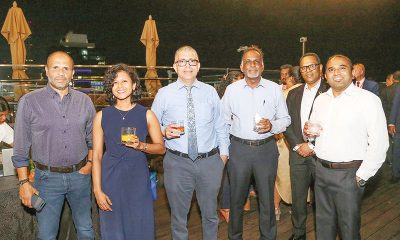
 Business4 days ago
Business4 days agoMembers’ Night of the Sri Lanka – Russia Business Council of The Ceylon Chamber of Commerce
-
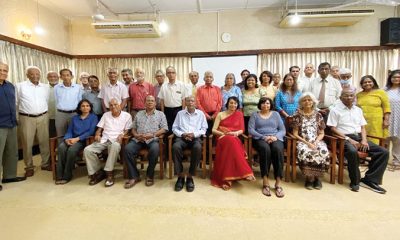
 Features4 days ago
Features4 days agoMinds and Memories picturing 65 years of Sri Lankan Politics and Society
-

 News5 days ago
News5 days agoLankan security forces Humanitarian Assistance and Relief Team working in Myanmar









